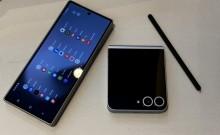The OnePlus Open's folding mechanism has been rigorously tested and it can be opened 1 million times, an equivalent of 10 years of usage, Kinder Liu, COO of OnePlus, said on Thursday.
As the company geared up to launch its much-anticipated foldable device with top-notch features globally on Thursday, Liu told IANS in an exclusive interaction that the key to this exceptional longevity is the single-spine hinge architecture the company has employed.
Here are excerpts from the interview:
Q: We have heard that OnePlus Open is capable of folding and unfolding a whopping 400,000 times. Is this true, and if yes, how does the device manage to accomplish such a daunting task? How sustainable is the device going to be?
A: The OnePlus Open has been engineered to endure 1 million successful folds, which translates to over 10 years of usage. To achieve this level of durability, it required meticulous design and innovative engineering.
![Bloatware in OnePlus Open? There's a prudent strategy for third-party app integration in place [read now]](https://data1.ibtimes.co.in/en/full/790947/bloatware-oneplus-open-theres-prudent-strategy-third-party-app-integration-place-read-now.jpg?h=450&l=50&t=40)
The key to this exceptional longevity is the single-spine hinge architecture we've employed. Unlike conventional folding designs with more complex three-part spines, our single-spine hinge minimizes stress on the folding mechanism. This results in reduced wear and tear on the components, allowing the OnePlus Open to withstand the rigors of frequent folding and unfolding.
Furthermore, aerospace-grade materials, such as titanium alloy, carbon fiber, and proprietary cobalt molybdenum alloy used in its construction, not only reduce the weight of the folding device but also contribute tremendously to its overall durability. Known for their robustness, these materials play a huge role in ensuring the structural integrity of the device, even after extensive use.
Q: Rumours suggest that the device is incredibly light. Can you elaborate on that?
A: The OnePlus Open is indeed incredibly light, and this is the result of our meticulous approach to mechanical design and material-component selection. OnePlus invested significantly in optimising the phone's weight and dimensions, ensuring that it feels just like a regular single-display flagship phablet when held on hand while allowing an uncompromising use experience of a folding device or Pro tablet.
One of the most significant breakthroughs contributing to the device's lightness is the innovative Flexion or "water-drop" shaped hinge. This hinge features a single-spine architecture, which, after extensive research and testing, was determined to be far more efficient than conventional hinge designs. By reducing the number of hinge components to just 69, as opposed to the typical 100 or more components in standard hinge designs, the OnePlus Open achieves a significantly lighter hinge. This, in turn, contributes to the overall weight reduction of the device.
Material choices also play a vital role in the OnePlus Open's lightweight design. OnePlus has adopted revolutionary materials, including an all-new camera sensor from Sony, the LYT-T808, which is part of Sony's new LYTIA sensor series. This sensor employs "Dual-layer Transistor Pixel technology" (also known as "Pixel Stacked") that enhances light capture and storage despite its relatively smaller sensor size. Additionally, the Open incorporates aerospace-grade materials like titanium alloy and reinforced carbon fiber in its construction. These materials are not only lightweight but also incredibly strong, allowing for a durable and robust device while minimizing its overall weight.
Q: How can the new foldable's durability (both front and back panels) be a game-changer in the ever-evolving foldable form factor?
A: Durability has always been one of the most important aspects of all our devices, regardless of category. With the OnePlus Open, we have taken a significant step forward in the ever-evolving smartphone industry.
To begin with, the use of Ceramic Guard on the cover screen and the multi-layer protection on the main display has made the OnePlus Open exceptionally robust. Ceramic Guard, in particular, is 20% more robust than Corning Gorilla Glass Victus. This added toughness enhances the overall resilience of the device, reducing the risk of scratches, cracks, and other forms of damage that can occur during everyday use.
![Bloatware in OnePlus Open? There's a prudent strategy for third-party app integration in place [read now]](https://data1.ibtimes.co.in/en/full/790946/bloatware-oneplus-open-theres-prudent-strategy-third-party-app-integration-place-read-now.png?h=450&l=50&t=40)
Additionally, the use of cutting-edge materials such as proprietary cobalt molybdenum alloy, carbon fiber, and titanium alloy further reinforces the device's structural integrity while keeping it lightweight. With this approach, we look to set new industry standards, demonstrating that foldable phones can be both durable and practical for everyday use without compromising on form or function.
In summary, the durability of the OnePlus Open sets new benchmarks for strength and longevity for the new form factor, all while maintaining a sleek and practical design. It not only enhances the user experience but also paves the way for the future of foldable devices.
Q: Entering the foldable market is a significant challenge. What do you hope to achieve?
A: With the OnePlus Open, we aim to bring great technology with a touch of elegance. The primary goal is to redefine what it means to be a foldable device in 2023. As the embodiment of the Never Settle Spirit, the OnePlus Open represents an uncompromising dedication, the same one that has been the foundation of our success over the last 10 years.
OnePlus recognises the importance of making a foldable device that is highly portable and user-friendly. We have invested in innovative hinge design and lightweight materials to ensure that the device feels like a regular single-display phablet, offering the convenience and portability that users expect.
Despite its lightweight design, we have not compromised on durability. The OnePlus Open has been engineered to withstand the rigors of everyday use and folding/unfolding, ensuring that it remains reliable and long-lasting. The camera is another aspect that we have not compromised. We have also placed a strong emphasis on imaging capabilities by integrating a revolutionary camera sensor from Sony. The device features Sony's "Dual-layer Transistor Pixel technology" offering exceptional imaging performance despite a relatively smaller sensor size.
The primary objective with our first-ever foldable is to bring the best smartphone, let alone a foldable to our users.
(IANS)









